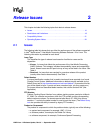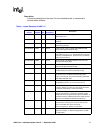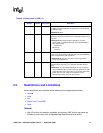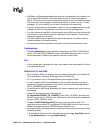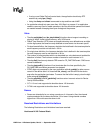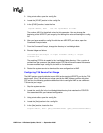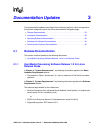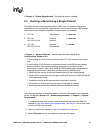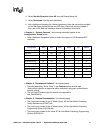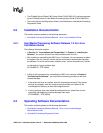
HMP Linux 1.2 Release Update, Rev 05 — September 2006 21
Global Call applications that use the host-based H.323 protocol stack may generate the
following error message in the gc_h3r.log file if the application enables the stack to send
the PROCEEDING message automatically.
! 22:22:19.393 ! M_SIGNAL ! L_ERROR ! 1 ! << SIGNAL::sendProcceding: RV
cmCallSendCallProceeding Failed : [-996]
This error message can be ignored. The PROCEEDING message is actually sent.
2.3 Compatibility Notes
Echo Cancellation With Continuous Speech Processing
For HMP Continuous Speech Processing (CSP), the Echo Cancellation parameter default
value is set to OFF (echo cancellation disabled). To conserve CPU usage/MIPs, the
application should keep this parameter value set to OFF.
For additional information about CSP, refer to the Continuous Speech Processing API for
Linux and Windows Library Reference and the Continuous Speech Processing API for
Linux and Windows Programming Guide.
Echo Cancellation With Conferencing
For HMP conferencing, the Echo Cancellation parameter default value is set to OFF (echo
cancellation disabled) for compatibility with DCB applications. This parameter must not be
turned ON by the application. Enabling echo cancellation causes poor conference audio
quality.
For additional information about Conferencing, refer to the Audio Conferencing API for
Linux and Windows Operating Systems Library Reference and the Audio Conferencing
API for Linux and Windows Operating Systems Programming Guide.
Configuring UDP/RTP Port Range
The HMP system currently defaults to UDP/RTP ports 6000 through 6100 and UDP ports
49152 through 49xxx for RTP streaming, where 49xxx = 49152 + twice the maximum
number of channels purchased under the licensing agreement. For example, if 120
channels were purchased, 49xxx would be 49392.
If the UDP/RTP port range used by the HMP system conflicts with other RTP service, the
following procedure describes how to configure HMP to use a different UDP/RTP port
range:
1. Stop the system service.
2. Locate the .config file in the /usr/dialogic/data directory that matches the FCD/PCD
files associated with your licensed configuration.




